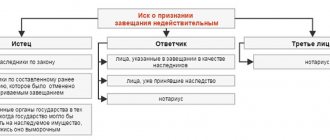Consequences of a void transaction under the Civil Code of the Russian Federation: basic information
The general consequences of void transactions are listed in Art. 167 of the Civil Code of the Russian Federation:
- the absence of legal consequences unrelated to the invalidity of such a transaction;
- mutual return by the parties of everything they received as part of this transaction.
For example, real estate acquired under an imaginary transaction (see the article “What is the procedure for recognition and consequences of an imaginary transaction?”) is returned to the seller, and the amount paid for it is returned to the buyer. Thus, the position of the parties that existed before the transaction is restored. When it is not possible to return what has been transferred in kind, then according to the general principle its value in monetary terms is returned.
In addition, special norms of legislation (for example, Articles 168–179 of the Civil Code of the Russian Federation, Article 16 of the Law “On the Protection of Consumer Rights” dated 02/07/1992 No. 2300-I, etc.) can, in addition to the indicated consequences, be regulated and other ways to protect the rights and interests of the injured party: compensation for losses, real damage, payment of a fine, etc.
Consequences of invalidity of a void transaction under the Civil Code of the Russian Federation: when is it possible to apply
Currently, the judicial authority is empowered to independently initiate the application of the consequences of the invalidity of a transaction (i.e., when they were not presented by the proper person) only in 2 situations (clause 4 of Article 166 of the Civil Code of the Russian Federation):
- if this is necessary to protect the interests of an unlimited number of persons (for example, the appeal ruling of the Stavropol Regional Court dated November 15, 2016 in case No. 33-8622/2016);
- this is directly provided for by law (for example, clause 4 of article 179 of the Civil Code of the Russian Federation).
IMPORTANT! When considering the issue of initiating the application of the consequences of the invalidity of a void transaction, the court must involve the parties in discussing this problem. At the same time, the judicial act following the consideration of the case must indicate which public interests are protected in this case or a specific rule of law allowing the application of these consequences in this situation if they are initiated by the court (clause 79 of the resolution of the Plenum of the Armed Forces of the Russian Federation dated June 23, 2015 No. 25).
In addition, such a requirement has the right to be submitted by the party to the transaction, and in certain cases regulated by law, also by another person (Clause 3 of Article 166 of the Civil Code of the Russian Federation). For example, the court, having seen that a void transaction also entailed a violation of the legal rights and interests of a person who was not a party to the transaction, granted his claim for the application of these consequences (see the decision of the Sverdlovsk District Court of Irkutsk dated October 31, 2016 in case No. 2-4629/ 2016).
Conditions giving rise to the invalidity of transactions and analysis of their legal consequences
For the tax authorities to be successful in suppressing the illegal avoidance of certain entities from taxation by concluding various, essentially invalid, transactions, it is necessary to recognize them as an offense, which gives greater urgency and focus to the efforts of the court in the fight against these socially undesirable and harmful phenomena.
In establishing the invalidity of transactions, judicial and arbitration practice has developed four types of requirements, in case of violation of which the transaction may be recognized as such.
Firstly, for the validity of transactions, it is necessary that its participants have appropriate legal capacity, an integral part of which is transactional capacity.
A transaction made by an incapacitated person is invalid. The law also recognizes as invalid a transaction, although made by a legally capable person, but at the time of its conclusion, he was in such a state where he could not understand the meaning of his actions or manage them (Article 177 of the Civil Code of the Russian Federation, hereinafter referred to as the Civil Code of the Russian Federation).
Unlike individuals, who can be subjects of transactions depending on their legal capacity, legal entities are always capable, and their participation in transactions is determined by the nature and content of their general and special legal capacity. A transaction made by a legal entity in conflict with the goals specified in its charter or regulations on it may be declared invalid by the court (Article 173 of the Civil Code of the Russian Federation).
Thus, for the validity of transactions, it is necessary that its subjects have legal capacity and the amount of legal capacity necessary for a given transaction.
Secondly, the transaction must be completed in the form prescribed by law. The invalidity of a transaction if the form required by law is not observed occurs only in cases where this is directly provided for by law (Articles 162, 165 of the Civil Code of the Russian Federation). The same consequences occur if the form provided for by the agreement of the parties is not followed, although by law it is not mandatory for this type of agreement (Article 162 of the Civil Code of the Russian Federation).
When the law does not contain direct indications of the invalidity of a transaction, due to the parties’ failure to comply with the appropriate form, they are deprived of the right, in the event of a dispute, to refer to witness testimony, but are not deprived of the right to provide written and other evidence (Part 1 of Article 162 of the Civil Code of the Russian Federation ).
Thirdly, it is necessary that the will of the subjects of the transaction be formed under normal conditions, and that the expression of will corresponds to their internal will.
A transaction is an act of will, and two elements should be distinguished in it: will (subjective) and expression of will (objective). Moreover, subjects have free will (clause 2 of article 1 of the Civil Code of the Russian Federation). Both elements of the transaction are necessary and equivalent, and only their unity contains the essence of the transaction.
If the condition of freedom to form the internal will is violated and if there is a discrepancy between the internal will and the expression of will, conditions associated with defects of will arise under which the transaction can or should be declared invalid.
Fourthly, the content of the transaction must comply with the requirements of the law. The legality and legality of a transaction is one of the main conditions for its validity. That is why the law recognizes as void a transaction that does not comply with the requirements of the law or other legal acts (Article 168 of the Civil Code of the Russian Federation).
Only the combination of all these four conditions ensures the validity of the transaction and leads to those legal results towards which the will of their subjects is aimed. If at least one of these conditions is violated, this entails the invalidity of the transaction, that is, it does not lead to the legal consequences that correspond to its content.
Thus, invalid transactions are civil offenses entailing certain negative consequences and having one of the following conditions:
a) their content does not comply with the requirements of the law or other legal acts;
b) the parties to the transaction do not have the required legal capacity;
c) unfree expression of the will of the parties to the transaction;
d) failure to comply with the established form of the transaction (in cases provided for by law).
The presence of conditions for the nullity or voidability of transactions entails a number of consequences aimed at, firstly, preventing its existence, secondly, eliminating the consequences of its commission, and thirdly, influencing its participants.
Once declared invalid, the transaction ceases to exist and should not be executed. This applies to both the nullity and voidability of transactions.
A transaction declared invalid is, as a rule, deprived of legal force from the moment of its completion. This means that everything received under the transaction by each party is deprived of its legal basis and in accordance with Art. 1102 and part 1 of Art. 1103 of the Civil Code of the Russian Federation is subject to seizure as an unjust acquisition. In this case, the return of property transferred under the transaction is possible as a result of its recognition as invalid, and not on the basis of a vindication claim. Thus, claims to invalidate transactions have a special nature, since only they are aimed at restoring rights or releasing from obligations, or both. Of course, the requirement to recognize the transaction as invalid will not be the only pleading clause of the statement of claim; it may include requests for the return of what was performed under the transaction, for the recovery of losses, and for compensation for moral damage. But regardless of this, the recognition of the transaction as invalid is of primary importance, which determines the onset of other consequences. In addition, when returning property under an invalid transaction, the moment of good faith is not taken into account, and, conversely, vindication does not require an assessment of the transaction, as a result of which the thing ended up in someone else’s possession.
A person who, without the grounds established by law or by a transaction, has acquired or saved property at the expense of another person, is obliged to return to the latter the unjustifiably acquired or saved property (Article 1103 of the Civil Code of the Russian Federation). Also, each party is obliged to return to the other party everything received under the transaction declared invalid. However, this does not apply to all invalid transactions. According to some of them (Articles 169, 179 of the Civil Code of the Russian Federation), all property received by the parties is recovered as state income.
In the legal literature, various points of view have been expressed regarding the legal nature of this penalty. Most authors believe that this collection is a confiscation1. Another part considers the seizure of property for state income as a new legal phenomenon2. Still others noted that confiscation of property is a fine3.
The term “confiscation” in the Civil Code of the Russian Federation in the chapter on the invalidity of transactions is not used, so it can be assumed that “confiscation” and “collection to the state’s income” are unlikely to be identical, although they have common features. Confiscation applies to any property, and collection to the state's income only applies to the property in respect of which the transaction was concluded, and only if there was execution by at least one party.
The law distinguishes between the legal and property consequences of invalid transactions. The legal consequences consist in recognizing the transaction as invalid if the conditions of nullity and voidability are met. As a rule, a transaction is declared invalid from the moment it is completed. However, there are transactions that cannot be declared invalid from the moment they are completed (for example, property rental); in this case, the law (clause 3 of Article 167 of the Civil Code of the Russian Federation) provides for the termination of its validity only for the future.
Invalidity may apply not only to the entire transaction, but also to part of it, if it can be assumed that the transaction would have been completed without the inclusion of this part (Article 180 of the Civil Code of the Russian Federation). For example, recognizing the validity of the will as a whole, the court may invalidate the condition according to which, among several heirs, a person is named who does not have the right to be an heir (for example, the murderer of the testator).
If a transaction made in violation of the law is not executed, then it is simply cancelled. If a transaction declared invalid is fully or partially executed, the question arises about the property consequences of its invalidity, which depend on the grounds for invalidity and the presence or absence of intent on the part of the parties.
The Civil Code of the Russian Federation provides for three main property consequences of declaring transactions invalid (Fig. 1):
- bilateral restitution (return of the parties to their original property position);
- unilateral restitution (the return to only one party of what it performed under the contract, and from the other party everything performed under the contract is confiscated to the state’s income);
- prevention of restitution (collection into state income of everything received by the parties to the transaction).
With bilateral restitution
each party is obliged to return to the other party everything received under the transaction. If it is impossible to return what was received in kind, its value in money is returned. According to paragraph 2 of Art. 167 of the Civil Code of the Russian Federation, it is applied in all cases of invalidity of transactions, unless the law specifies other property consequences. Bilateral restitution is provided, for example, for the invalidity of transactions made:
- with a violation of the form;
- in violation of the rules on state registration;
- exceeding the legal capacity of a legal entity;
- going beyond the limits of authority to complete a transaction;
- incompetent citizens;
- minor citizens under 14 years of age;
- citizens with limited legal capacity;
- a citizen incapable of understanding the meaning of his actions or managing them;
- under the influence of a misconception of significant significance.
The parties return to their original position because everything performed under the transaction turned out to be obtained without sufficient grounds, because the transaction that served as such a basis was declared invalid. Such property consequences apply when there are no grounds to apply penalties to either party, since both of them acted innocently or through negligence, because the transaction violated legal requirements not related to the application of punitive measures.
In these cases, the persons who executed the transactions retain the right to what they transferred in the execution procedure and receive their property back. And if the property has not been preserved, then they have the right to monetary compensation equal to the value of the property transferred under the transaction at the time of execution.
Another main consequence of the invalidity of transactions is unilateral restitution,
which consists in the fact that only one (bona fide) party receives back what has been performed. The other (unscrupulous) party does not receive the performance; it is transferred to the state. If the unscrupulous party did not have time to fulfill the transaction, what is subject to execution is transferred to the state’s income.
Consequences in the form of unilateral restitution with the conversion into state income of the property received under the transaction by the victim are provided for cases of invalidity of transactions concluded:
- under the influence of deception;
- under the influence of violence;
- under the influence of a threat;
- under the influence of a malicious agreement between a representative of one party and the other party;
- under difficult circumstances;
- for a purpose contrary to the foundations of law and order and morality, if only one party acted guilty (including at the request of the tax authorities).
Rice. 1. Consequences of invalidity of transactions
If the transaction is executed by both parties, then the guilty party is obliged to return to the innocent party everything received from it, and everything received by the latter is recovered as state income. Moreover, if the guilty party fulfilled the transaction partially, and the innocent party fully, then everything that was performed by the guilty party and what it still had to fulfill is subject to recovery to the state’s income. This means that if both parties performed the transaction partially, then in this case only what was performed by the guilty party, corresponding to the equivalent received from the other party, is subject to recovery to the state’s income.
No restitution
and the conversion of everything that was or should have been transferred under the transaction to the income of the state is provided for when the transaction is declared invalid as completed for a purpose contrary to the foundations of law and order and morality (Article 169 of the Civil Code of the Russian Federation). In establishing this rule, the legislator proceeded from the fact that the intent of the parties to the transaction extended not only to its completion, but also to its execution. Thus, if both parties acted intentionally and both fulfilled the transaction, everything they performed is recovered as state income. If both parties acted intentionally, but only one of them fulfilled the transaction, everything that was received under the transaction, and what the party that partially executed the transaction still had to transfer to the other party, is collected as state income. If only one party acted intentionally in a transaction and only she fulfilled the transaction, then the innocent party must transfer to the state income everything that she received under the transaction, but she herself must not fulfill it. If the proceeds received from such transactions have been spent, then compensation for the value of the property in money is transferred to the state income.
Among the many difficulties in mastering the new Civil Code of the Russian Federation, problems of the consequences of void transactions have occupied an important place in judicial practice. You can often encounter a situation where an item transferred under a void transaction has already been sold to third parties by the time of the dispute and vindication of this item from a bona fide purchaser becomes impossible. In this case, restitution is limited to the collection of monetary compensation in place of the already missing item, therefore, the insolvency of a party to the transaction means a direct loss of property.
External, shallow effect of restitution under Art. 167 of the Civil Code of the Russian Federation is that it does not affect the subjective rights to the property of the parties to an invalid transaction: the property is returned to them not because the parties have any right to it, but because it was previously transferred by them. The consequence of these features is not only the high efficiency and efficiency of restitution, but also its preliminary nature of protection. For example, it is possible that the tenant sold the rented item to a third party. Since he did not have the right to this, the thing is returned to him by way of restitution, and then the lessor has the right to recover his property from him, as well as the damages caused on the basis of the lease agreement.
Thus, in judicial and arbitration practice there is an expanded understanding of restitution. However, this approach is not indisputable due to the following circumstances: in this case, liability is assigned to the bona fide purchaser, and not to the person who violated the rights of the owner; This is contrary to the literal meaning of Art. 167 of the Civil Code of the Russian Federation, which speaks only about the parties to a void transaction and about no one else. The illegal owner of a thing receives it in a void transaction, otherwise he would have the right to the thing, and his possession would be legal. That is why the problem of the consequences of a void transaction is at the same time a problem of protecting illegal possession.
Restitution problems manifest themselves in housing disputes, which unfold approximately according to one scenario: residential premises are alienated, then they are sold, exchanged, or otherwise transferred to third parties for compensation. If after this it turns out that from the very beginning the transaction for the alienation of residential premises was illegal, which means that all subsequent transactions with the same subject became illegal, then the problem of the proprietary consequences of the nullity of the transactions arises for the court.
This situation is very common. On the one hand, the nullity of the transaction itself means that the original owner is automatically restored to his rights regardless of the return of the premises to him. On the other hand, a bona fide purchaser in a paid transaction is protected from a vindication claim by the owner due to the well-known limitation established by Art. 302 of the Civil Code of the Russian Federation.
The courts are faced with a seemingly insoluble problem: while refusing vindication, they must recognize the right of the illegal bona fide purchaser to retain the apartment further. At best, this situation is resolved by reaching a compromise, when the original owner is recognized as the owner of the residential premises, and the persons who have settled in this housing receive the right to use this premises or the status of a tenant.
Difficulties in applying the consequences of invalid transactions also arise when considering economic disputes, when recognition of a transaction as such is not the subject of claims, but during the trial the fact of the nullity of the transaction associated with the dispute and the legal consequences of its invalidity are established. Thus, the tax authorities, recognizing as void agreements on joint activities of commercial organizations that were concluded for the purpose of tax evasion, apply financial sanctions to them. When appealing such acts in court, if the court evaluates agreements on joint activities as invalid, the plaintiff-taxpayer asks to establish bilateral restitution. After this, the parties to the agreement will return to their original position, as a result of which the object of taxation disappears - the turnover of products, works or services and, consequently, the grounds for applying tax sanctions disappear.
The practice has become very common in the field of economics and law enforcement when contracts are signed by deputy heads of executive bodies and other officials of commercial organizations, although such a right is not granted to them by the constituent documents. Often, such contracts are affixed with the company’s seal, and the transcript of the signature contains the name of the authorizing official (director). The parties usually do not raise the issue of the invalidity of the transaction, but reserve this argument in case of possible prosecution. Then the interested party raises the question before the arbitration court about declaring the transaction invalid.
When declaring this transaction invalid, it is necessary to pay special attention to the legal status of the persons who signed the agreement. If these persons are listed in the constituent documents as bodies of a legal entity (board, directorate), their actions should be qualified under Art. 174 of the Civil Code of the Russian Federation, that is, as transactions made beyond the authority of an official. If these persons are not members of the bodies of a legal entity, they must act on the basis of a power of attorney, through the institution of representation. In these cases, the transaction may be declared invalid due to its conclusion by an unauthorized person (Article 183 of the Civil Code of the Russian Federation).
Rapid privatization of state property in the early 90s. XX century gave rise to numerous disputes regarding the redistribution of property. The courts take an ambiguous position and evaluate such transactions as both void and voidable. In Art. 30 of the RSFSR Law “On the Privatization of State and Municipal Property” provides a list of grounds for invalidating privatization transactions, which is possible only in court. Consequently, privatization transactions are considered voidable.
Analyzing the main consequences of declaring transactions invalid, we can highlight the following. Often the property liability of the party guilty of concluding an invalid transaction is insignificant in comparison with the benefit that it should have received under it. She is liable to the extent of what was performed or to be performed. In this regard, it seems appropriate to supplement the legislation with an indication of the possibility of imposing a fine on the party guilty of concluding an invalid transaction within the cost of the performance performed by the injured party.
In addition to the main consequences of declaring transactions invalid, the law provides for the possibility of additional consequences in the form of reimbursement of expenses, the cost of lost or damaged property, etc. These additional consequences are borne only by the party guilty of concluding the transaction.
Additional property consequences are provided for by the Civil Code of the Russian Federation in cases of recognition of the invalidity of transactions made:
- minors under 14 years of age;
- minors aged 14 to 18 years;
- a citizen with limited legal capacity;
- a citizen declared incompetent;
- a citizen incapable of understanding the meaning of his actions or managing them;
- under the influence of delusion;
- under the influence of deception, violence, threat, malicious agreement between a representative of one party and the other party, a combination of difficult circumstances, etc.
In addition, these additional consequences are borne only by the party guilty of entering into the transaction.
Thus, additional financial liability is a sanction for the harm caused and occurs, along with the seizure of property when the transaction is declared invalid, in addition to this and regardless of this in the presence of guilt.
Regardless of whether the transaction is void or voidable, both become the subject of judicial proceedings to resolve the issue not only of declaring the voidable transaction invalid, but also of applying the consequences of the invalidity of the void transaction if it is executed. In addition, in a number of cases the law provides for the possibility of resuscitating a void transaction. Thus, transactions made by citizens recognized by the court as incompetent, as well as minors under 14 years of age (clause 2 of article 171 and clause 2 of article 172 of the Civil Code of the Russian Federation), and transactions that are not put into the notarial form required by law or have not been passed state registration (clauses 2, 3 of Article 165 of the Civil Code of the Russian Federation) may be recognized by the court as valid. Such rehabilitation of a transaction by a court decision gives rise to the legal consequences of the transaction from the moment it was completed, that is, the court gives its decision retroactive effect, extending the legal consequences to an already elapsed period of time.
An appeal to the court with a demand to recognize a contested transaction as invalid and to apply the consequences of the invalidity of such a transaction can be carried out within 1 year from the day when the person learned or should have learned about the circumstances that are the basis for the invalidity of the transaction. For transactions made under the influence of violence or threat, the law establishes a special procedure for calculating the limitation period, its running begins from the day when the violence or threat ceased (Clause 2 of Article 181 of the Civil Code of the Russian Federation).
However, to claims for declaring a voidable transaction invalid and applying the consequences of its invalidity, the right to present which arose before 01/01/95, the statute of limitations established for the corresponding claims by previously in force legislation, that is, 3 years, applies.
Since a void transaction is invalid even without recognition of this fact by the court, the law establishes only a limitation period for filing claims for the application of the consequences of the invalidity of a void transaction. This period is much longer and exceeds the general limitation period; it is equal to 10 years and is calculated from the day when the execution of the void transaction began (clause 1 of Article 181 of the Civil Code of the Russian Federation). In the absence of execution, a void transaction does not lead to any consequences, therefore there is no need to calculate the limitation period from the moment the void transaction is concluded. Calculating such a period from the moment the execution of a void transaction begins seems more justified, since the purpose of filing a claim is precisely to eliminate the consequences of the execution of a void transaction. However, the law left open the question of the limitation period for filing claims for recognition of a valid void transaction. Therefore, one should be guided by the general limitation period of 3 years (Article 196 of the Civil Code of the Russian Federation).
The introduction into the Civil Code of the Russian Federation of special limitation periods for declaring transactions invalid, which was not the case in previous legislation, significantly reduced the period of uncertainty in legal relations generated by such transactions and simplified civil circulation.
Thus, summarizing the above, it can be noted that the legal consequences of recognizing the invalidity of transactions are not so much contractual and not only tortious in nature, but are an independent legal phenomenon, different from both.
M.V. Volkov,
Leading specialist of the legal department
Interregional Inspectorate of the Ministry of Taxes and Taxes of Russia for the Central Federal District
Magazine “Everything for an accountant”
№ 16, 2003
Subscription indexes according to catalogues: Rospechat Agency – 72007; UFPS RF “Press of Russia” – 45305.
____________
1Rabinovich N.V.
Invalidity of transactions and its consequences. - L., 1960. P. 134.
2Ryasentsev V.A.
Transactions under Soviet civil law. - M., 1951. P. 100.
3 Novitsky I.B.
Transactions. Limitation of actions. - M., 1954. P. 97.
Consequences of a void transaction: restitution
The consequences of the invalidity of the transaction are:
- 2-sided restitution - the return of the situation that existed before the violation of the right, which involves the parties returning to each other everything acquired under the transaction in kind, and if it is impossible to do this, in the form of monetary compensation. Its application does not depend on the good faith of the parties (for example, the decision of the Kirovsky District Court of the city of Ufa of the Republic of Bashkortostan dated November 2, 2016 in case No. 2-9119/2016).
- 1-sided restitution - 1 of the parties returns everything acquired by it under the transaction to the second party, which in turn is obliged to transfer everything acquired under the transaction to the state.
- Non-admission of restitution - everything acquired or expected to be acquired by the parties is recovered as state income. It is usually applied to insignificant transactions that are clearly antisocial in nature (for example, the decision of the Kuvshinsky City Court of the Sverdlovsk Region dated September 29, 2016 in case No. 2-768/2016).
The last 2 options are applied when the court establishes the presence of intent when implementing a transaction for purposes that are obviously contrary to the foundations of law and order or morality:
- If both parties had such intent, then restitution is prevented.
- If only 1 party pursued the stated goal, then 1-sided restitution is applied (see paragraph 2 of the ruling of the Constitutional Court of the Russian Federation dated 06/08/2004 No. 226-O).
In addition, 1-sided restitution can be applied when, due to the peculiarities of the legal nature of certain legal relations, 2-sided restitution is unenforceable (for example, in relation to a gift agreement declared void, see the appeal ruling of the Tyumen Regional Court dated November 2, 2016 in case No. 33 -6767/2016).
Commentary on Article 167 of the Civil Code of the Russian Federation
1. An invalid transaction does not give rise to the legal consequences that the parties who made it sought to achieve, but entails the consequences of its invalidity, which are established by law and, as a general rule, are unfavorable for the participants in an invalid transaction. In this case, the invalidity of a transaction, if there are proper legal grounds for it, as a general rule occurs from the moment of its completion.
However, the Civil Code allows exceptions to these general rules. According to paragraph 2 of Art. 172 an insignificant transaction of a minor in his interests may be recognized by the court as valid. In addition, a voidable transaction may be declared invalid by the court not from the moment it was completed, but for the future (see paragraph 6 of this commentary).
2. The general consequence of the invalidity of a transaction, relating to both voidable and void transactions, is, according to paragraph 2 of Art. 167 return to each party of everything received under the transaction, called mutual restitution. If it is impossible to return the item received, its value in money will be refunded.
When reimbursing the cost, two questions may arise: how it should be determined and at what point. In the event of a dispute between the parties, these issues should be resolved according to the rules of the Civil Code on the price of the contract (clause 3 of Article 424) and the date of determination of compensable losses (clause 3 of Article 393), as norms that can be used by analogy with the law.
In relation to lease transactions, the practice of arbitration courts proceeds from the fact that what is received is expressed in the use of property (Bulletin of the Supreme Arbitration Court of the Russian Federation, 1998, No. 5, p. 27). When renting a vehicle with a crew, what is received is expressed in the use of property and the use of labor (Bulletin of the Supreme Arbitration Court of the Russian Federation, 2000, No. 11, p. 22).
3. Other consequences of the invalidity of the transaction, which, according to clause 2 of Art. 167 may be provided for by law; they are defined in the Civil Code in different ways: in general form and for certain types of invalid transactions.
A general additional consequence of invalidity is the rule of Art. 1103 of the Civil Code on the application of the provisions on unjust enrichment to demands for the return of what was executed under an invalid transaction. This is an important innovation of the Civil Code compared to previous legislation.
This rule allows the parties to an invalid transaction, in addition to the return of what was received under the transaction in kind or its value, to also demand income that was or could be extracted from this property, and interest on monetary compensation (Article 1107 of the Civil Code). When returning property or reimbursing its value, you can demand reimbursement of necessary expenses with an offset to the benefits received (Article 1108 of the Civil Code).
4. In relation to certain types of invalid transactions, as an exception to the general rules of paragraph 2 of Art. 167, mutual restitution is not provided for and a rule is introduced on the return of what is received by only one party (Article 179 of the Civil Code) or on the recovery of what is received under the transaction into budget revenue (Article 169 of the Civil Code).
The special consequences of invalidity of purchase and sale transactions and lease of an enterprise are established by Art. 566 and 663, and the application of such consequences depends on the court’s assessment of the circumstances mentioned in these articles of the Civil Code.
5. In some cases of invalidity of transactions, the Civil Code, as other additional consequences, gives the interested party the right to demand compensation for losses incurred as a result of such invalidity. The claim for damages is allowed by virtue of Art. 178, 179, 684, paragraph 3 of Art. 951. If this right is not mentioned in the Civil Code, there is no basis for making such a claim.
6. Contents of the voidable transaction in accordance with clause 3 of Art. 167 may exclude recognition of it as invalid from the moment of its completion, and then the validity of the transaction is terminated by the court for the future. These are mainly cases where the voidable transaction has already been partially executed.
In relation to the executed and preserved part of the transaction, as a general rule, the mutual rights and obligations of the parties remain in force. For example, when terminating an invalid lease agreement for the future, the parties are obliged to fulfill their mutual obligations related to the actual use of the property (pay rent, costs of maintaining the property, etc.). However, the court, taking into account the specifics of individual cases of invalidity, may make a different decision on this issue and change the previously established rights and obligations of the parties.
7. When checking the constitutionality of the provisions of paragraphs 1 and 2 of Art. 167 of the Civil Code, the Constitutional Court of the Russian Federation, in its Resolution No. 6-P of April 21, 2003, made the following conclusions. The rights of a person who considers himself the owner of property are not subject to protection by satisfying a claim against a bona fide purchaser using the legal mechanism established by paragraphs. 1 and 2 tbsp. 167 Civil Code, i.e. by declaring the transaction invalid. Such protection is possible only by satisfying a vindication claim, if there are provisions for this under Art. 302 of the Civil Code, grounds giving the right to reclaim property from its bona fide purchaser (RG, 2003, No. 81, p. 11). Previously, a similar legal conclusion was made in paragraph 25 of the Resolution of the Plenum of the Supreme Arbitration Court of the Russian Federation No. 8, explaining the procedure for protecting property rights.
Tax consequences of void transaction
An analysis of current judicial practice allows us to come to the following general conclusions regarding the application of tax consequences after qualifying the relevant transaction as invalid:
- recognition of the invalidity of a transaction in itself cannot entail a change in tax legal relations, except in cases where such a basis is directly provided for by the legislation on taxes and fees (for example, the resolution of the Autonomous Court of the Republic of Buryatia dated March 14, 2016 in case No. A10-3611/2015, etc.);
- the mere fact of qualifying a transaction as invalid is not a basis for making adjustments to tax liabilities, and their recalculation can be made only after the implementation of 2-sided restitution (determination of the Supreme Arbitration Court of the Russian Federation dated September 28, 2009 No. VAS-10263/09);
- tax obligations associated with the invalidity of a transaction arise for the taxpayer at the moment the relevant court decision gains legal force (for example, the resolution of the Arbitration Court of the Ural District dated September 15, 2016 in case No. A50-28459/2015).






